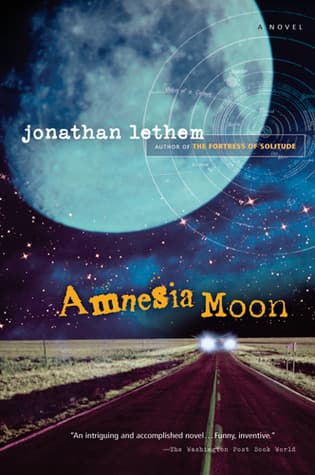
Book Review Summary: Amnesia Moon
Introduction
In Jonathan Lethem's wryly funny novel, "Amnesia Moon," readers are introduced to Chaos, a young man living in a movie theater in post-apocalyptic Wyoming. Chaos's existence is unbearable, but he soon discovers that his post-nuclear reality may have no connection to the truth. Intrigued by this revelation, Chaos embarks on a journey with a fur-covered girl named Melinda to find answers. As they travel through the United States, they encounter various towns affected by the mysterious source of the apocalypse. However, none of the people they meet can fill in their incomplete memories or answer their questions. Gradually, figures from Chaos's past begin to emerge, leading him to remember his forgotten life as Moon.
About Jonathan Lethem
Jonathan Lethem, the author of "Amnesia Moon," is an accomplished American novelist, essayist, and short story writer. Born on February 19, 1964, Lethem has made a name for himself in the literary world with his unique blend of science fiction and other genres. His first novel, "Gun, with Occasional Music," published in 1994, showcased his ability to combine science fiction with detective fiction elements. Lethem gained widespread recognition with his 1999 novel, "Motherless Brooklyn," which won the National Book Critics Circle Award and achieved mainstream success. His 2003 novel, "The Fortress of Solitude," became a New York Times Best Seller and further solidified his reputation as a talented writer. In 2005, Lethem received a MacArthur Fellowship, which further cemented his position in the literary world.
Analysis of Views
-
Surreal and Trippy: Readers describe "Amnesia Moon" as a surreal and trippy novel that explores the nature of reality and identity. The book's ever-shifting cascade of conflicting realities and its obsession with the fragile nature of identity resonate with readers who appreciate the genre-bending aspects of science fiction.
-
Dystopian and Apocalyptic: Many readers find the post-apocalyptic setting of the book intriguing. The various pocket dystopias that Chaos encounters throughout his journey add to the overall sense of dystopian despair. The exploration of how people's memories and perceptions shape their reality is a central theme that appeals to readers who enjoy dystopian and apocalyptic stories.
-
Philip K. Dick Influence: Jonathan Lethem's love for Philip K. Dick is evident in "Amnesia Moon." Readers note similarities between Lethem's writing style and Dick's works, particularly in the surreal and dreamlike quality of the narrative. The book's exploration of reality and identity, as well as its ambiguous ending, evoke memories of Dick's works such as "Ubik" and "The Three Stigmata of Palmer Eldritch."
-
Engaging Characters: Despite the surreal and confusing nature of the story, readers find the characters in "Amnesia Moon" engaging and well-defined. Chaos's journey and his interactions with Melinda and other characters add depth to the narrative and keep readers invested in the story. The book's exploration of Chaos's past and his search for answers resonates with readers who appreciate complex character development.
-
Lack of Conclusion: Some readers express disappointment with the book's lack of a clear conclusion. The ambiguous ending leaves readers wondering about the nature of reality and whether Chaos's memories are reliable. While this ambiguity can be intriguing for some readers, others find it frustrating and unsatisfying.
Reasons for Recommendation
-
Intriguing Exploration of Reality and Identity: Readers recommend "Amnesia Moon" for its exploration of reality and identity. The book delves into the nature of memory, perception, and the impact of external influences on one's sense of self. This philosophical aspect appeals to readers who enjoy thought-provoking literature.
-
Surreal and Trippy Writing Style: Jonathan Lethem's unique writing style, which incorporates elements of surrealism and trippiness, is a significant draw for readers who appreciate genre-bending literature. The book's dreamlike quality adds an extra layer of intrigue to the storytelling, making it a recommended read for those seeking something different from conventional science fiction.
-
Engaging Characters: Despite the surreal and confusing nature of the story, readers find the characters in "Amnesia Moon" engaging and well-developed. Chaos's journey and his interactions with Melinda and other characters add depth to the narrative, making it a recommended read for those who appreciate complex character development in their fiction.
Reasons for Not Recommendation
-
Ambiguous Ending: Some readers find the lack of a clear conclusion in "Amnesia Moon" frustrating and unsatisfying. The ambiguous ending leaves readers wondering about the nature of reality and whether Chaos's memories can be trusted. While this ambiguity can be intriguing for some readers, others prefer a more conclusive resolution to their stories.
-
Lack of Clarity: Readers who prefer clear explanations and coherent narratives may find "Amnesia Moon" confusing or lacking in clarity. The book's surreal and dreamlike quality can make it challenging for readers to follow the storyline and understand the characters' motivations. This aspect may not appeal to those who prefer more straightforward storytelling in their fiction.
Conclusion
"Amnesia Moon" by Jonathan Lethem is a surreal and trippy novel that explores the nature of reality and identity in a post-apocalyptic world. The book's exploration of memory, perception, and external influences on one's sense of self resonates with readers who appreciate thought-provoking literature. Jonathan Lethem's unique writing style, which incorporates elements of surrealism and trippiness, adds an extra layer of intrigue to the storytelling. However, some readers may find the lack of a clear conclusion or the confusing nature of the narrative frustrating or lacking in clarity. Overall, "Amnesia Moon" is recommended for those who enjoy genre-bending science fiction with complex characters and philosophical explorations of reality and identity.